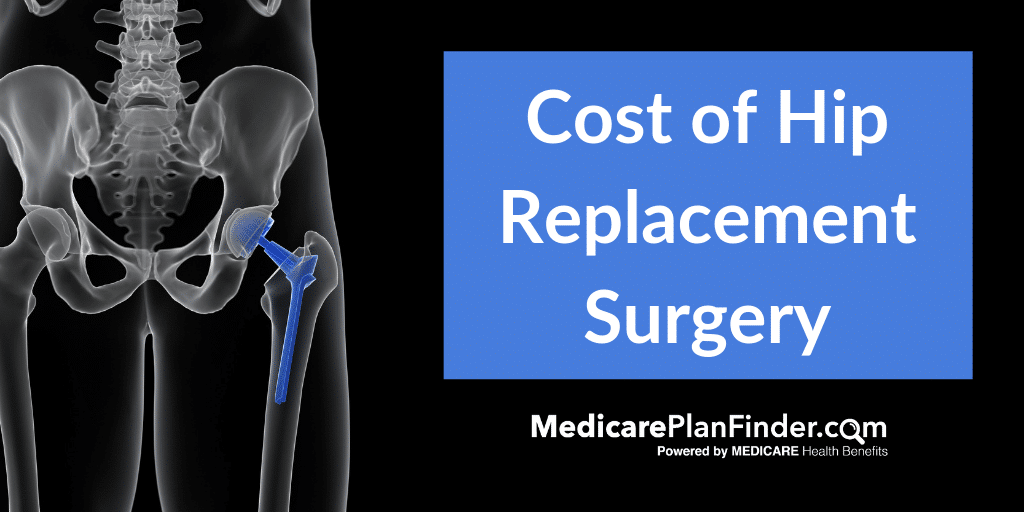
Does Medicare Cover the Cost of Hip Replacement Surgery?
March 24, 2020An estimated 2.5 million Americans have undergone total hip replacements. Conditions such as osteoarthritis and rheumatoid arthritis can cause the hip joint to wear down so much that a hip replacement may be the only course of action to improve your mobility.
The total cost of hip replacement surgery can be staggering if you don’t have help from insurance. How much does a hip replacement cost with insurance?
A total hip replacement costs anywhere from $32,000 to $45,000, based on general coverage guidance from healthcare.gov. The total cost usually includes everything from the surgeon’s initial evaluation to post-operation hospital care.
Increases in year-to-year costs are small under stable economic conditions. There was only a small increase in hip replacement 2019 costs compared to medicare hip replacement 2018 costs.
If you’re one of the millions of Americans who needs a hip replacement, you may wonder, “Does Medicare cover hip replacements?” Yes, but you have to meet certain eligibility requirements, and you may still have some out-of-pocket costs even with Original Medicare.
You may also be asking, “How much does Medicare pay for hip replacement surgery?” The good news is that it will cover at least some of all types of costs.

How Much Does Medicare Pay for Hip Replacement Surgery?

The likelihood of needing hip replacement surgery increases with age. Seniors 65 and older, people with ALS or ESRD, or people who have received SSDI for at least 25 months qualify for Medicare.
Original Medicare (Parts A and B) will help cover the cost of hip replacement surgery if your doctor determines it’s medically necessary because other treatments have failed. The answer to how much Medicare pays for hip replacement surgery will depend on whether it is medically necessary and what types of coverage you have.
Medicare Hip Replacement Costs With Medicare Part A
Medicare Part A is hospital insurance. This Medicare coverage helps pay for a semi-private room, meals and nursing care during your stay.
Part A will only cover a private room if your doctor says it’s medically necessary or it’s the only room available.
Medicare hip replacement reimbursement includes skilled nursing care after your surgery. Part A helps cover the first 100 days of in-patient care including physical therapy.
The Medicare Part A deductible can apply, and you may be responsible for copays or coinsurance.
Part B Coverage for Hip Replacement Surgery
Medicare Part B will help cover medical expenses such as doctor’s fees for the initial evaluation and post-op visits, surgery in an outpatient surgical facility, and outpatient physical therapy.
You may be responsible for paying the Part B deductible, which was $185 in 2019, and 20% of the Medicare-approved costs. Medicare Part B may also cover your post-operative durable medical equipment (DME) such as a cane or in-home grab bars.

Medicare Part D Coverage
Original Medicare does not cover post-op prescription drugs, but Medicare Part D includes prescription drug coverage. Your doctor may prescribe blood thinners to prevent clotting or painkillers to take during your recovery.
You can use Medicare Part D or private health insurance plans to cover prescription drugs.
Will Medicare Help Pay for a Knee Replacement?
Medicare Part A and Medicare Part B each cover a different aspect of joint replacement surgery. Medicare Part C will cover knee replacement, including both knees at once, only if your doctor considers it necessary.
Medicare Part D prescription drug program will cover the cost of painkillers, antibiotics, and anticoagulants required for the surgery.
What Medicare Advantage and Medicare Supplements Cover
Private insurance plans offer Medicare Advantage (MA) plans, and they are a great way to get all of the Part A and Part B benefits along with some unexpected offerings such as meal delivery, non-emergency transportation, vision and dental insurance.
Certain MA plans even cover prescription drugs! You will pay a monthly premium with MA plans, but some are as low as $0. Coverage varies depending on your location and the plans available, so look for a qualified professional to help you sort through the plans in your area and find the right one.
Medicare Supplement (Medigap) plans pick up where Original Medicare leaves off. Like MA plans, private insurance companies offer Medigap plans.
The difference is that Medigap Plans only cover your financial responsibilities such as coinsurance and deductibles. You cannot have both a Medicare Supplement and a Medicare Advantage plan at the same time, so it’s important to find out which one is best for you.
Medicare Supplement Insurance plans work with Medicare Part A and Medicare Part B to cover out-of-pocket costs for Medicare hip replacements.
Post-Hip Replacement Surgery Costs
Does medicare cover rehab after hip replacement? Yes. Sometimes, after hip replacement surgery, you may need some help.
For example, throughout your recovery, you might need orthotic devices or other equipment to help you get around. Medicare may cover those devices if your doctor says that they are medically necessary.
Some Medicare Advantage plans may provide extra coverage, and Medicare Supplement plans may cover your copayments for devices.
You also might be interested in Medicare Advantage plans that have an OTC or over-the-counter benefit. This can help offset some of your costs related to pain medication and other items you need to pick up from your pharmacy for your recovery.
Additionally, some people may need physical therapy to recover from surgery or other hip injuries. Medicare Part B may cover your physical therapy by as much as 80%, as long as it is deemed medically necessary.
Why You Might Need a Hip Replacement
Several conditions can cause the hip to deteriorate to the point of needing surgery including:
- Osteoarthritis
- Rheumatoid Arthritis
- Avascular Necrosis
- Bone Tumors
- Hip Injuries
Hip replacement surgery can restore the hip joint and full range of motion. The type of replacement you receive depends on the doctor’s recommendation and your general health.
The surgery may use a cemented or uncemented prosthesis to connect the replacement parts to the healthy bone after the unhealthy cartilage is removed. The entire recovery process can take three to six months.
Understanding the Hip Replacement Procedure (Orthopedic Hip Arthroplasty)
Hip arthroplasty, also known as total hip replacement, is a common orthopedic procedure. During the surgery, your damaged bones and some soft tissue are removed.
The hip joint is replaced with an implant, which can be ceramic, plastic, or metal.
In a traditional replacement, a 10-12 inch incision is made on the side of the hip. In less-invasive procedures, the incision may only be three to six inches.
Some people may not be eligible for a minimally invasive procedure. Be sure to ask your doctor if you aren’t sure what your procedure will be like.

Medicare Hip Replacement Scenario
To better understand how everything works together, let’s take the real-world example of a 75-year-old man who has osteoarthritis.
He’s been working with his doctor to manage his symptoms, and things have been going well. One day, the man takes a nasty fall and breaks his hip. This man’s Medicare hip replacement process involves several steps:
- He doesn’t go to the hospital right away because the bruising around his hip looks like one of his routine injuries. The man makes another doctor’s appointment, and his doctor takes X-rays and determines the man will need a hip replacement.
- His doctor will determine if the man is healthy enough for surgery, and then the doctor refers the man to an orthopedic surgeon. Until this point, everything falls under Medicare Part B.
- The man decides to have his surgery in an outpatient facility. He’s responsible for his deductible if he hasn’t met it, or the out-of-pocket maximum for his plan.
- The surgery is successful, so he has physical therapy appointments so he can recover as quickly as possible. The man has a Medicare Advantage Prescription Drug plan, so he collects his blood thinners and painkillers for only a small copayment at the pharmacy.
- Along with prescription drugs, the man’s surgeon prescribes a cane and grab bars to help the man perform daily tasks. The man’s MA plan also covers those items, because his doctor determined they are medically necessary.
Contact Us Today
A comprehensive Medicare plan can help cover the cost of hip replacement surgery. If you need help finding coverage, we can help! Call us at (833)-567-3163 or contact us here today.

This post was originally published on May 15, 2019, and updated on March 24, 2020.

